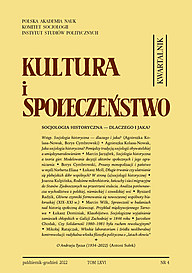SOCJOLOGIA HISTORYCZNA A TEORIA GIER
MODELOWANIE DECYZJI AKTORÓW SPOŁECZNYCH I JEGO OGRANICZENIA
HISTORICAL SOCIOLOGY AND GAME THEORY.
SOCIAL ACTORS’ DECISION MODELLING AND ITS LIMITATIONS
Author(s): Marcin JarząbekSubject(s): Social history, History and theory of sociology, Social Theory
Published by: Instytut Studiów Politycznych PAN
Keywords: historical sociology; game theory; model; July crisis 1914; serfdom;
Summary/Abstract: The article aims to analyse the opportunities for and limitations in using game theory in historical sociology. Selected examples of such possible applications are used: an iterated game of chicken in the case of the July Crisis of 1914, which led to the outbreak of World War I, and the dilemma of the prisoner, with an asymmetric arrangement between players, for understanding the relations between peasant and feudal lord in the serf economy system. Both examples serve to show the usefulness of game-theory models as tools enabling an understanding of past reality as a consequence of human decisions and not merely the realisation of their intentions. At the same time, the author emphasises that modelling the past in itself is only one of the stages of understanding history, and one that just like the others (collecting data and creating narratives) is an interpretative action dependant on the knowledge and competence of the researcher.
Journal: Kultura i Społeczeństwo
- Issue Year: 66/2022
- Issue No: 4
- Page Range: 29-43
- Page Count: 15
- Language: Polish

